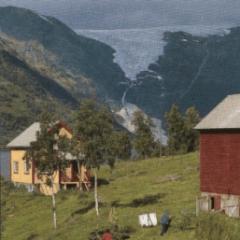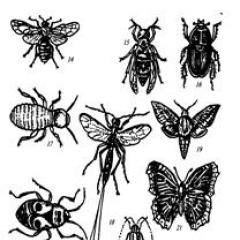Planet Ocean. Green Arctic
The green country stretches from the center of Norway to the north. From green fields to green ice. Green is a symbol of abundance in culture, industry and nature. The color green also signifies purity, authenticity, resilience and enterprise. This is probably due to the geographical location: large areas of the region are located between the Arctic Circle and the North Pole. There should have been tundra here, but thanks to the Gulf Stream and the people who inhabit these places, the region is an area of Norway full of life and activity. Welcome to the Green Arctic.
Before we talk about the area known as the Green Arctic, we will take you on a journey around the globe. Let's head west along latitude 65, first through the icy expanses of Iceland and Greenland. Then on to Canada, where we'll pass north of Hudson Bay before seeing the real tundra. The journey takes us through Alaska, through the pack ice of the Bering Strait and into the endless expanses of permafrost in Northern Siberia. Having passed Russia, Northern Finland and Northern Sweden, we return to our starting point - to the Green Arctic. Once again we are in the southern part of the region, which includes the following areas: North Trondelag, Nordland, Troms, Finnmark and the northernmost regions of Norway, including Svalbard.
 There should be a tundra here! Instead, you suddenly discover vast agricultural areas. It seems almost contrary to nature. But everything is explained simply: the mild climate is generated by the Gulf Stream, a life-giving ocean current that carries warm waters from the southern latitudes. Like a friendly breath, the Gulf Stream flows north along the coast and makes the environment suitable for habitation. True, the weather changes quickly and dramatically, and the ocean winds are wet and some of the strongest. Yet this part of Norway has the kind of climate you'd expect to find much further south. Archaeological excavations show that people have lived here for 10,000 years. When the ice retreated at the end of the last ice age, people settled on the first areas of freed land. First - on the islands, and then, as the ice receded, settlements moved further into the mainland. The country was rich. The sea abounded in fish, and the land in wild animals.
There should be a tundra here! Instead, you suddenly discover vast agricultural areas. It seems almost contrary to nature. But everything is explained simply: the mild climate is generated by the Gulf Stream, a life-giving ocean current that carries warm waters from the southern latitudes. Like a friendly breath, the Gulf Stream flows north along the coast and makes the environment suitable for habitation. True, the weather changes quickly and dramatically, and the ocean winds are wet and some of the strongest. Yet this part of Norway has the kind of climate you'd expect to find much further south. Archaeological excavations show that people have lived here for 10,000 years. When the ice retreated at the end of the last ice age, people settled on the first areas of freed land. First - on the islands, and then, as the ice receded, settlements moved further into the mainland. The country was rich. The sea abounded in fish, and the land in wild animals.
Later, minerals and hydropower laid the foundations for industry. Great demands were placed on people and their ability to develop new industries. The complexity of the tasks reflected on human character. One of his features is a somewhat defiant position, which can be expressed something like this: “We can handle it ourselves.”
Much has changed since our ancestors settled on this land. But traces of distant dramatic events have survived to this day.
Let's go together on a journey through this region. From the agricultural areas of Central Norway along the coastal strip and mountain plains - north to Finnmark. And then, from the northernmost point of Europe, we will move to Spitsbergen - an archipelago located even further north, in the Arctic Ocean.
 It will be a journey full of diversity, reflecting the conditions in which people live. From long summer days, when plants and trees grow around the clock, to harsh polar nights with snow and bitter frost. We travel from the ancient Vikings to modern Norwegians, and from traditional occupations to today's industrial wonders.
It will be a journey full of diversity, reflecting the conditions in which people live. From long summer days, when plants and trees grow around the clock, to harsh polar nights with snow and bitter frost. We travel from the ancient Vikings to modern Norwegians, and from traditional occupations to today's industrial wonders.
And all this because the Green Arctic is a country of contrasts, as one would expect from a region that stretches for more than 1,800 km, and at its narrowest point is only 6 km. The edges where the mountains rise almost 1500 m directly from the surface of the fjords, and the width of the coastal strip varies over time.
With the advent of the new year 2017, which has been declared the Year of Ecology in Russia, we want to share with you a scientific and educational project implemented by the team of the Roads of Discovery Foundation together with the tour operator of children's recreation Fairvater on the basis of the Artek International Children's Center.In the fall of 2016, we became official partners of the Artek International Children's Center and held the autumn environmental session “Planet Ocean” at the most important camp in our country. The environmental and technological program “Planet Ocean” was based on the idea of creating a network of marine camps that would function not only as health and sports recreation camps, but could also become real marine research centers and technical bases for children and youth. One of these projects has been carried out on the Black Sea coast for decades.
When developing and writing the program, we set ourselves the following tasks: to instill in the younger generation responsibility for their actions towards society and nature; provide continuous environmental education and early career guidance for children; popularization of modern science, unedifying prevention of bad habits.
The Planet Ocean program included a wide variety of activities that complement each other, from learning how to tie sea knots to scientific laboratory research.
The program participants included the winners of the environmental project competition “ We are building a city in the Ocean - on water and under water» from different regions of Russia: Moscow region, Yamal-Nenets Autonomous Okrug, Buryatia, Karelia, Republic of Crimea. From April to August 2016, students of secondary schools and gymnasiums sent their projects for the construction of underwater cities. The competition included works not only in the field of natural sciences, but also in fine arts, literature, and music. The most powerful works became prize-winners, and their authors received a free trip to the Artek International Children's Center for an environmental shift.
The program course included compulsory and specialized subjects. Compulsory subjects are related to various aspects of marine studies. No matter how different they are from each other in names and content, they are united by one common goal - to prepare children physically and morally for a different perception of the nature of their region, the main part of which is the forest, sea, mountains, to educate not consumers, but creators and defenders . These courses include:
- history of the region as a basis for understanding ecology;
- basics of classical ecology with elements of biogeography;
- basics of safety, first aid and water rescue;
- basics of survival in field conditions and in extreme situations;
- general physical training and acquisition of the necessary skills of a researcher and traveler.
Specialized courses are
- maritime professions: scuba diver, motor mechanic, yachtsman;
- marine biology, geography, geology, astronomy, archeology, history;
- underwater and surface photo and video filming;
- archery;
- a foreign language as a means of communication with foreign colleagues on an expedition.
All these disciplines made the program interesting, varied, rich and allowed the children to acquire important practical skills and enrich life experience.
According to the author and coordinator of the “Planet Ocean” program - Doctor of Biological Sciences, leading researcher at M.V. Lomonosov Moscow State University - such programs increase schoolchildren’s interest in science and enable them to turn from dreamers into real scientists, gaining practical experience, approach your choice of profession more consciously.
The children studied samples of coastal zones, soil and wastewater under a microscope. Young explorers mastered the underwater world in diving classes with professional diver instructors from the FARWATER diving and travel club, and practiced archery, developing endurance and character, with an honored coach of Russia. Artists showed their creative talents in the plein air of marine painters, and experts in foreign languages had the opportunity to take the international Cambridge exam under the guidance of the coordinator of the “” program, Natalya Nikolaevna Shvindina. The result of the shift was the defense of scientific projects, the best of which were published in scientific journals, and a sea ball, during which each squad performed a historical ballroom dance.
For three weeks, Artek residents touched the underwater world from different sides in a team of 18 professional specialists in the field of science and pedagogy. The guys learned a lot of new things and took their first steps in the Year of Ecology.
The next competition of environmental projects for 2017 has already started - “Planet Ocean. Green Arctic" and each of you will be able to take part in research activities, and the winners will spend an unforgettable shift at the Artek International Children's Center. The competition rules can be found here: Download file: (downloads: 301)
View online file:

Today, September 25, the international environmental change “Planet Ocean” begins at the international children's center “Artek” (Republic of Crimea). Green Arctic”, which will last until October 15.
The participants of the session were 385 boys and girls from 11 to 16 years old from different countries of the world, who came together to contribute to the future of our planet. The participants included 200 young researchers from the circumpolar region - the Republics of Komi and Sakha (Yakutia), Arkhangelsk, Murmansk and Tyumen regions, Nenets, Chukotka and Yamalo-Nenets autonomous districts, Krasnoyarsk Territory, as well as from Moscow.
The Yamalo-Nenets Autonomous Okrug is represented at the international session by guys from Gubkinsky, Labytnangi, Muravlenko, Novy Urengoy, Noyabrsk and Salekhard, as well as from Krasnoselkupsky, Nadymsky, Priuralsky and Shuryshkarsky districts. These are schoolchildren who have particularly distinguished themselves in the environmental field, prize-winners and winners of various competitions, authors of research projects, participants in subject Olympiads and environmental conferences.
It should be noted that the selection of Yamal candidates was carried out by a working group, which included employees of the district departments of education, youth policy and tourism, international and foreign economic relations and the interregional public eco-sociological organization “Green Arctic”.
Work on the shift “Planet Ocean. Green Arctic" is dedicated to discussing the scientific, technological and environmentally friendly development of Russia, the role of the aquatic environment and land in the Arctic region of Russia and on the planet as a whole, human development of marine spaces and adjacent continental and island Arctic territories. The shift program includes a variety of activities: from acquiring sea knot tying skills to scientific laboratory research.
As part of the shift, young ecologists will also learn about the Arctic Volunteers project, within which a group of volunteers first went on an environmental expedition in 2012 to Bely Island. Over the five years of environmental activities on the island, more than 52 hectares of land have been cleared, about 1,200 tons of scrap metal and other garbage have been collected, and 19 dilapidated buildings unsuitable for use have been dismantled. Over the entire period of the project’s implementation, 150 volunteers from 17 regions of Russia and 7 countries near and far abroad (Austria, Bulgaria, Germany, Israel, China, Ukraine and Chile) took part in it.
In 2017, Arctic Volunteers began cleaning up Vilkitsky Island, where more than 800 tons of scrap metal had accumulated.
Another significant topic of the shift will be another “Green Arctic” project - the regional patriotic project “Kara Expeditions”. It is based on the story of the tragedy of the BD-5 convoy off the coast of the Kara Sea near Bely Island on August 12, 1944. In 2014, the implementation of the Kara Expeditions project began in Yamal. The corresponding order was signed by the Governor of the Yamal-Nenets Autonomous Okrug Dmitry Kobylkin. At the end of July 2015, a few meters from the shore of the Kara Sea in the north-west of Bely Island, a search party discovered a burial with the remains of 13 people. A small memorial complex in memory of the tragedy and a memorial belfry “Bells of Memory” were installed on the island. Also, memorial plaques in memory of the victims were installed in Salekhard and Voronezh. Today, the Kara Expeditions project is known not only at the regional, but also at the federal and international levels.
In addition, one of the key events of the international shift “Planet Ocean. Green Arctic" will be a competition of environmental and technological projects. Among the objectives of the competition are to attract the attention of schoolchildren to science and technology, help in forming an informed choice of a future profession, and involve them in the active process of direct participation in the scientific, technological and environmentally friendly development of Russia in various spheres of life.
The international session is held with the support of the interregional public eco-sociological organization “Green Arctic”, the Department of International and Foreign Economic Relations of Yamalo-Nenets and the non-profit organization “Yamal Cooperation Foundation”.
Let us also recall that in April of this year, an agreement on the development of international and interregional cooperation was signed between the Department of International and Foreign Economic Relations of Yamal and the Artek International Children's Center support fund.


